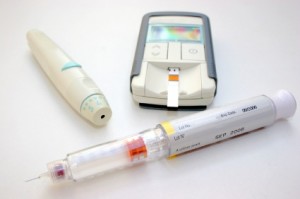April 17, 2014
 In a 1,100-word story on its front page, the New York Times (4/17, A1, Tavernise, Grady, Subscription Publication) reports that research published in The New England Journal of Medicine shows “the first broad national picture of progress against some of the most devastating complications of diabetes, which affects millions of Americans, finding that rates of heart attacks, strokes, kidney failure and amputations fell sharply over the past two decades.” Researchers found that the largest “declines were in the rates of heart attacks and deaths from high blood sugar, which dropped by more than 60 percent from 1990 to 2010, the period studied.” The study’s lead author, Edward W. Gregg, a senior epidemiologist at the CDC, “said researchers used four federal data sets – the National Health Interview Survey, the National Hospital Discharge Survey, the United States Renal Data System, and Vital Statistics – over a 20-year period to give a comprehensive picture of diabetes outcomes.”
In a 1,100-word story on its front page, the New York Times (4/17, A1, Tavernise, Grady, Subscription Publication) reports that research published in The New England Journal of Medicine shows “the first broad national picture of progress against some of the most devastating complications of diabetes, which affects millions of Americans, finding that rates of heart attacks, strokes, kidney failure and amputations fell sharply over the past two decades.” Researchers found that the largest “declines were in the rates of heart attacks and deaths from high blood sugar, which dropped by more than 60 percent from 1990 to 2010, the period studied.” The study’s lead author, Edward W. Gregg, a senior epidemiologist at the CDC, “said researchers used four federal data sets – the National Health Interview Survey, the National Hospital Discharge Survey, the United States Renal Data System, and Vital Statistics – over a 20-year period to give a comprehensive picture of diabetes outcomes.”
[Read more…]
Study: Diabetes-related complications declining
New diabetes guidelines may help standardize care, increase prevention
March 3, 2014
 Updated diabetes care guidelines place emphasis on the A1C blood test when testing for diabetes, a shift that could help physicians standardize diabetes screening and prevention with the consistent use of one primary test.
Updated diabetes care guidelines place emphasis on the A1C blood test when testing for diabetes, a shift that could help physicians standardize diabetes screening and prevention with the consistent use of one primary test.
The American Diabetes Association’s (ADA) updated Standards of Medical Care Guidelines explain that the A1C has advantages over other diabetes tests, including greater convenience and stability and fewer factors that can skew results.
The testing recommendations in the guidelines include:
• Testing should be considered in adults of any age with a body mass index of 25 or more, and one or more of the known risk factors for diabetes.
• Because age is a major risk factor for diabetes, testing should begin at 45 years old for those without these risk factors.
• Testing should take place within the health care setting because of the need for follow-up and discussion of abnormal results.
[Read more…]
New two-hormone Roche drug shows promise in diabetes, obesity
October 30, 2013
(via www.Reuters.com)
by Ben Hirschler
An experimental drug that mimics the effects of two naturally occurring hormones appears to work significantly better than existing single-hormone medicines against diabetes and obesity, scientists said on Wednesday.
A team of German and U.S.-based researchers said they are using “mother nature’s toolkit” to seek a breakthrough for treating type 2 diabetes and related obesity which is affecting rapidly growing numbers of people in the West and many developing nations.
The new dual-action molecule, which is being developed by Swiss drugmaker Roche, targets receptors for hormones known as GLP-1 and GIP that play a critical role in regulating the body’s metabolism.
Currently approved injectable drugs such as Novo Nordisk’s Victoza and Byetta from Bristol-Myers Squibb and AstraZeneca mimic only GLP-1.
[Read more…]
 NBC Nightly News (3/31, story 10, 2:55, Williams) reported that “researchers have found that weight loss surgery for” patients with type 2 diabetes “can be more effective than taking medication in beating this disease.”
NBC Nightly News (3/31, story 10, 2:55, Williams) reported that “researchers have found that weight loss surgery for” patients with type 2 diabetes “can be more effective than taking medication in beating this disease.”